Catena is now Pearl Talent! Same mission, new name.
The demand for applicants seeking virtual assistant jobs part time is experiencing a significant increase in 2026, showcasing the changing dynamics of modern business operations. Virtual assistants have become essential for businesses looking to streamline tasks, increase productivity, and reduce costs. However, along with the benefits come specific challenges. These challenges include finding qualified individuals, ensuring the security of sensitive data, and complying with privacy policies.
Pearl provides a reliable offshore placement service that startups and businesses can trust to overcome these challenges. With a proven track record, they have earned a reputation for connecting businesses with highly skilled virtual assistants who excel in areas such as executive assistance, customer service, and social media management. This strategic partnership can be transformative for companies looking to leverage the expertise of virtual assistant jobs part time.
This blog will provide valuable insights into part-time virtual assistant jobs in 2026. We'll delve into the advantages of hiring part-time virtual assistants for tasks like customer service, social media management, and email handling. If you're interested in finding the ideal virtual assistant to meet your business needs, continue reading to discover how Pearl can lend a hand. Uncover the incredible potential of virtual assistant jobs for transforming your business operations.
Stick around for valuable insights!
What is a Virtual Assistant
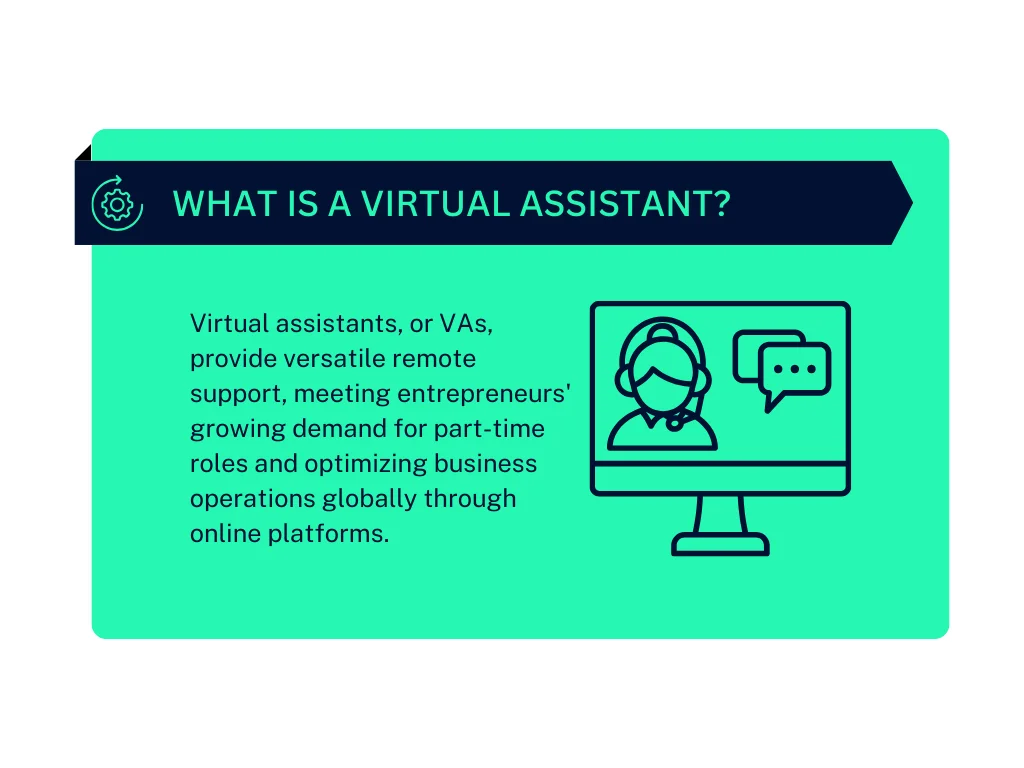
Virtual assistants, or VAs, are versatile professionals crucial in various fields. Equipped with a diverse skill set and the ability to work remotely, they have become invaluable assets for entrepreneurs, businesses, and founders. In recent years, there has been an exponential increase in demand for virtual assistant jobs, mainly part-time positions. Entrepreneurs worldwide recognize the immense value of hiring virtual assistants to support their endeavors. These individuals offer a broad range of services. They handle administrative tasks and fulfill specialized roles like social media management and executive assistance. With the internet catalyzing seamless collaboration, businesses now have access to a global talent pool of virtual assistants.
The flexibility and cost efficiency of virtual assistant jobs, particularly part-time roles, make them highly attractive to entrepreneurs. By delegating various tasks to virtual assistants, business owners can focus on their core activities. Virtual assistants play a crucial role in optimizing operations by managing emails, scheduling appointments, and handling customer inquiries. Their flexibility to adapt to varying workloads and the option of hiring them part-time make them an excellent resource optimization choice.
As we continue to embrace the digital age where virtual connections are just as common as physical ones, the demand for virtual assistants grows, catering to the evolving needs of businesses that require efficient remote support. To tap into this talent pool and benefit from these opportunities, seekers should explore the vast landscape offered by online platforms that connect businesses with skilled virtual assistants.
Virtual Assistant Jobs: Part Time vs. Full Time
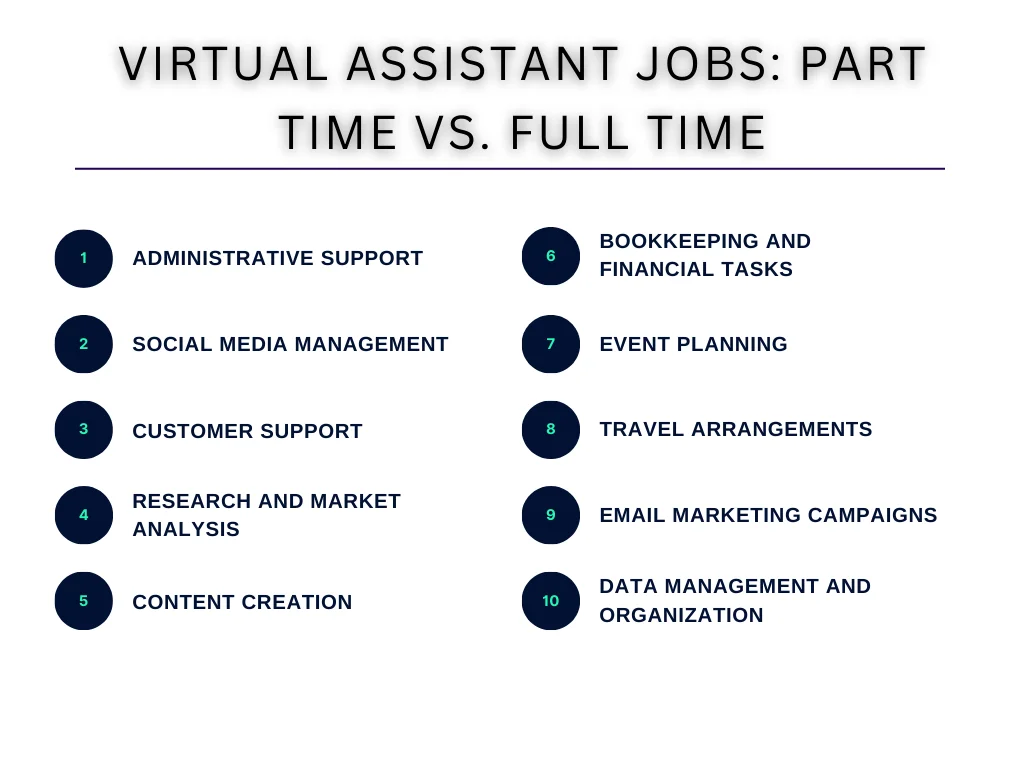
As we delve into the dynamics of virtual assistant jobs, this section focuses on the critical distinction between part-time and full-time positions. Let's explore why businesses may opt for virtual assistant jobs part time applicants and what tasks are best suited for each category.
Best Types of Assignments for Part-Time Virtual Assistants
Part-time virtual assistants offer valuable support to businesses of any size. They bring a versatile skill set and expertise that can significantly enhance efficiency across various tasks. Let's explore top assignments that make the most out of part-time virtual assistant services in 2026.
Administrative Support
Virtual assistants are highly skilled at providing efficient administrative support. They can expertly handle tasks such as managing email correspondence, scheduling appointments, and handling routine data entry. By delegating these responsibilities to a part-time virtual assistant, entrepreneurs, and business owners can dedicate more time and energy to the strategic aspects of their business.
Social Media Management
Having a solid online presence is crucial in the digital era we live in. Hiring part-time virtual assistants can effectively manage social media accounts, create engaging content, and interact with the audience. This helps business owners maintain a connection with their customer base without having to devote constant time and effort.
Customer Support
Hiring part-time virtual assistants is a practical solution for managing customer inquiries and providing support. These assistants are skilled in responding to customer concerns via email, chat, or phone calls, ensuring timely resolution and improving the overall customer experience.
Research and Market Analysis
Conducting research is a crucial but time-consuming task for any business. By hiring part-time virtual assistants, founders can delegate market research, competitor analysis, and data gathering. This allows them to make well-informed decisions based on valuable insights.
Content Creation
Content marketing continues to be an effective tool for business. By hiring part-time virtual assistants with writing, design, or video editing skills, companies can ensure a continuous stream of engaging content through blog posts, newsletters, graphics, and videos. Virtual assistants can also use AI technologies like text-to-speech or AI voiceovers for audio content creation, making producing high-quality voiceovers and sharing different types of content easier. This helps maintain consistency and attract audience attention.
Bookkeeping and Financial Tasks
Proper financial management is essential for the success of any business. One way to achieve this is by leveraging the expertise of part-time virtual assistants who specialize in accounting. These professionals can provide valuable support in bookkeeping, expense tracking, and generating financial reports. By utilizing their services, businesses can ensure.
Event Planning
Planning and organizing events, whether virtual or in-person, can be pretty demanding. By hiring part-time virtual assistants, founders can delegate the event planning task to professionals who will take care of every aspect from logistics to coordination, like organizing network diners. This allows founders to host successful events without the hassle and stress.
Travel Arrangements
For busy founders, managing travel plans can be a time-consuming task. However, part-time virtual assistants (VAs) are available to handle essential logistics such as booking flights, finding accommodations, finding the best hotel, planning itineraries, and optimizing credit card points. With their assistance, business trips can be organized seamlessly and efficiently.
Email Marketing Campaigns
Email marketing continues to be a successful approach for connecting with customers. By utilizing part-time virtual assistants, businesses can create and implement email marketing campaigns that increase engagement and drive conversions.
Data Management and Organization
Hiring part-time virtual assistants can significantly enhance data management by organizing files, maintaining databases, and ensuring valuable information security. This streamlined approach significantly improves overall business efficiency.
Best Types of Assignments for Full-Time Virtual Assistants
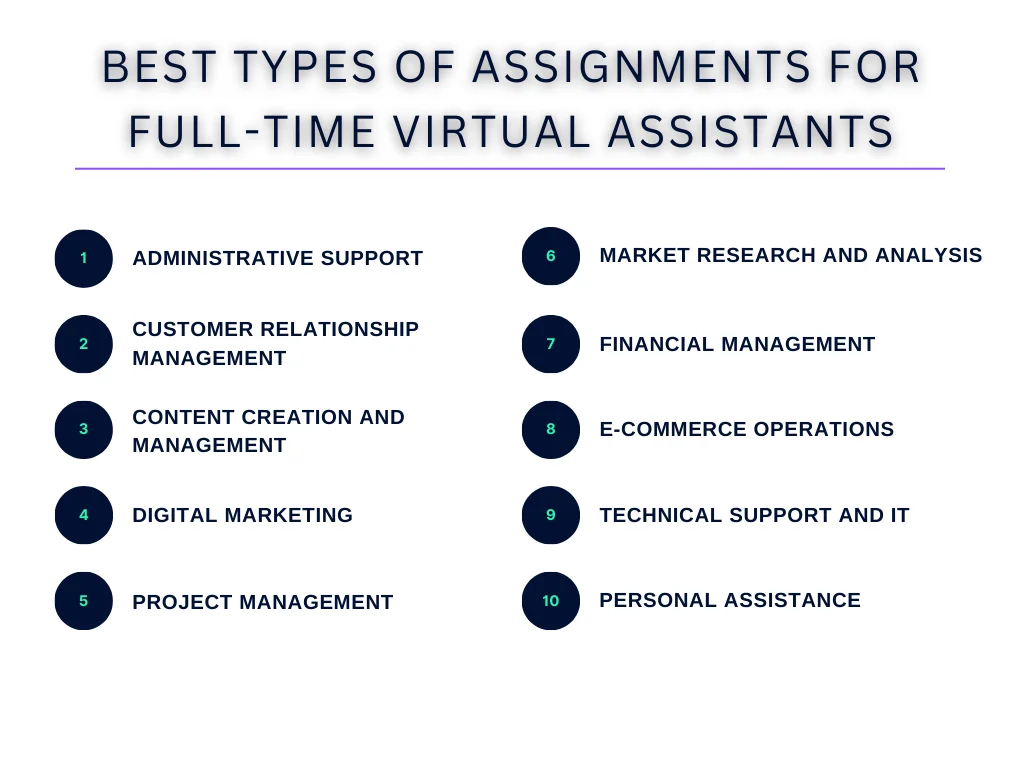
Full-time virtual assistants play a vital role in the success of businesses and entrepreneurs by efficiently handling a wide range of tasks. These tasks are diverse and span across various industries and domains, showcasing the critical contribution that full-time virtual assistants make in different work environments. Let's explore some of the best types of assignments that are ideally suited for these dedicated professionals.
Administrative Support
Administrative tasks form an essential foundation for many businesses, and full-time virtual assistants are highly skilled at delivering comprehensive support in this domain. They possess the ability to efficiently manage calendars, schedule appointments, handle emails, and ensure the seamless operation of day-to-day activities. Such dedication and meticulous attention to detail are exceptionally vital for busy executives and entrepreneurs with demanding schedules.
Customer Relationship Management
Building and maintaining strong customer relationships is crucial for any business's success. By employing full-time virtual assistants, businesses can effectively manage customer inquiries, feedback, and support requests. Additionally, these assistants can play a vital role in organizing and ensuring easy accessibility to valuable client information in customer databases.
Content Creation and Management
Content marketing proves to be a valuable strategy, effectively connecting businesses and captivating their desired audience. The utilization of dedicated virtual assistants greatly enhances the content creation, editing, and management processes. From crafting engaging blog posts and compelling social media updates to informative newsletters, virtual assistants play a crucial role in ensuring the success of various content initiatives. They also monitor how content performs and provide valuable suggestions for improvement.
Digital Marketing
In today's ever-changing digital landscape, it is crucial for businesses to establish a solid online presence. Hiring dedicated virtual assistants who specialize in digital marketing can be invaluable in managing advertising campaigns, social media accounts, and search engine optimization (SEO) efforts. These professionals are adept at analyzing data and adapting strategies to maximize online visibility.
Project Management
Good project management is essential for completing tasks and initiatives. Having full-time virtual assistants who can handle project management responsibilities ensures that projects stay on schedule, deadlines are met, and resources are allocated efficiently. These assistants can use project management tools to streamline processes and encourage collaboration among team members.
Market Research and Analysis
Market research is crucial for making informed decisions. Virtual assistants who work full-time can handle market research tasks, such as identifying trends, analyzing competitors, and determining opportunities. Data analysts can analyze information and generate reports that help businesses make informed strategic decisions and maintain a competitive edge.
Financial Management
Proper financial management plays a vital role in driving the success of any business. One effective solution to ensure sound financial practices is hiring a dedicated virtual assistant specializes in finance. Skilled professionals in the field offer a wide range of advantages. They handle critical tasks such as bookkeeping, invoice management, expense tracking, and budget creation. By leveraging their expertise, they can help you make well-informed decisions regarding your finances.
E-commerce Operations
In managing an e-commerce business, various responsibilities come into play. These include handling product listings, overseeing inventory management, processing orders, and providing impeccable customer support. To ensure seamless operations, hiring dedicated virtual assistants can bring significant benefits. Their assistance improves customer satisfaction and contributes to the overall growth of the business.
Technical Support and IT
In the modern digital era, technical difficulties can significantly disrupt operations. However, having full-time virtual assistants with strong technical skills can offer IT support, troubleshoot issues, and ensure that systems and software are always up to date. Taking a proactive approach like this minimizes downtime and enhances productivity levels.
Personal Assistance
Entrepreneurs and executives often need personal assistance that goes beyond their professional duties. Hiring a full-time virtual assistant can be beneficial as they can support tasks such as travel planning, shopping, and managing personal appointments. This allows busy individuals to prioritize their core responsibilities.
Benefits of Virtual Assistant Jobs Part Time Employees
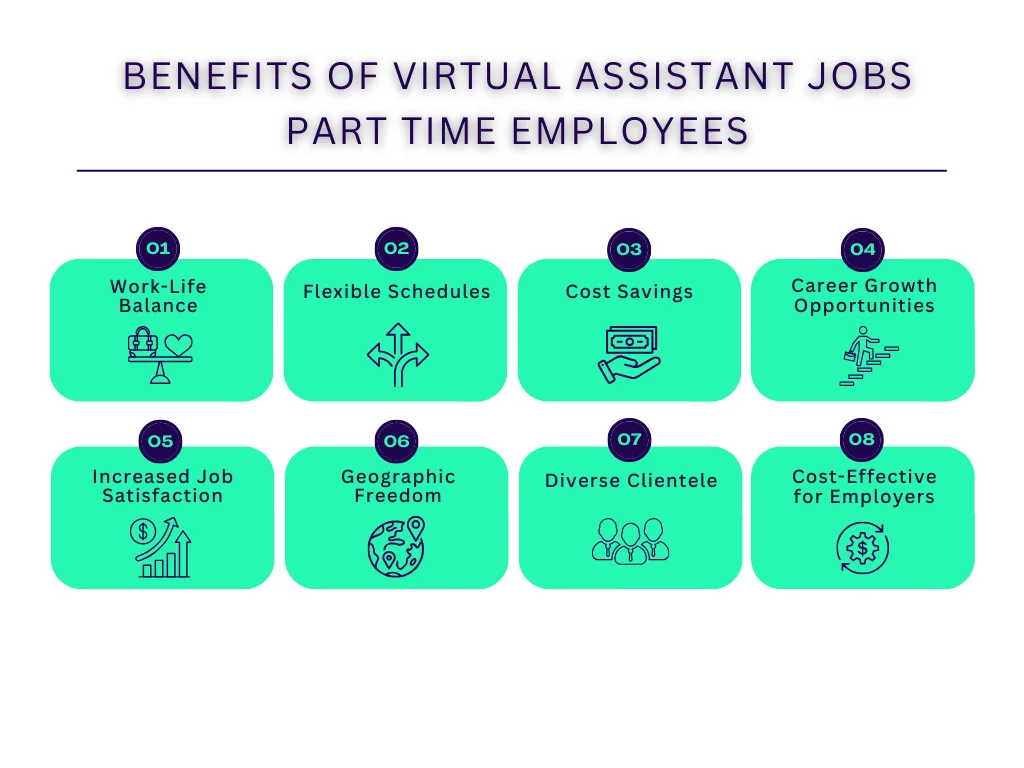
In the modern and dynamic work environment, part-time positions as virtual assistants offer valuable flexibility for individuals seeking autonomy and businesses aiming to optimize their operations. These roles mutually benefit both employees and employers, fostering a symbiotic relationship. Let's explore the advantages of embracing a part-time virtual assistant role:
Work-Life Balance
Flexible virtual assistant jobs part time positions allow employees to find a harmonious balance between their work and personal lives. By having fewer working hours, individuals can effectively manage their schedules, fulfill personal obligations, and prevent burnout.
Flexible Schedules
Virtual assistant jobs part time seekers are appealing because they offer flexibility. Employees can choose working hours to balance other responsibilities or pursue personal interests.
Cost Savings
Working part-time from home offers significant cost savings for employees. Commuting expenses, work attire costs, and even meal expenses can be reduced since employees have the convenience of preparing food at home.
Career Growth Opportunities
A part-time virtual assistant role provides valuable opportunities for career advancement. Individuals stepping into these positions can build a strong professional network, gain valuable experience, and take advantage of flexible schedules to pursue additional education or certifications.
Increased Job Satisfaction
Part-time virtual assistant jobs offer autonomy and flexibility, often resulting in higher job satisfaction. Employees have more control over their work environment and can customize their schedules to fit their preferences.
Geographic Freedom
Part-time virtual assistants offer a significant advantage in working remotely from any location with an internet connection. This grants them the flexibility to relocate or travel without compromising their employment.
Diverse Clientele
As part-time virtual assistants, individuals can collaborate with clients from various industries and backgrounds. This invaluable exposure fosters cultural awareness and enriches the overall work experience.
Cost-Effective for Employers
Hiring part-time virtual assistants can offer businesses a cost-effective solution. By opting for this approach, organizations can tap into a highly skilled and diverse talent pool while avoiding the extra expenses typically associated with hiring full-time employees. These additional costs encompass providing benefits and office space.
Conclusion
Hiring part-time virtual assistants offers numerous advantages for startups and businesses. It enables them to tap into a global network of skilled professionals with administration, marketing, and customer support expertise. Additionally, hiring a virtual assistant jobs part time applicant helps optimize costs by ensuring that payment is based solely on the hours worked, without the added overhead expenses associated with full-time employment.
A significant player in this field is Pearl, a specialist in linking business with virtual assistants ideally suited to their specific requirements. Through their platform, Pearl simplifies hiring by matching founders with virtual assistants with the exact skills necessary for their business operations. This personalized approach guarantees that founders receive the support they require, whether it involves managing emails, conducting market research, or handling social media tasks.
Virtual assistant jobs have become essential. As businesses evolve, it's crucial for entrepreneurs to embrace this flexible staffing option to scale efficiently and stay competitive. With Pearl's experience, finding the ideal virtual assistant for your business is now more accessible than ever before, revolutionizing the way entrepreneurs build and grow their ventures.
Book a consultation today and explore the possibilities.
Frequently Asked Questions
Originally Published
September 25, 2023


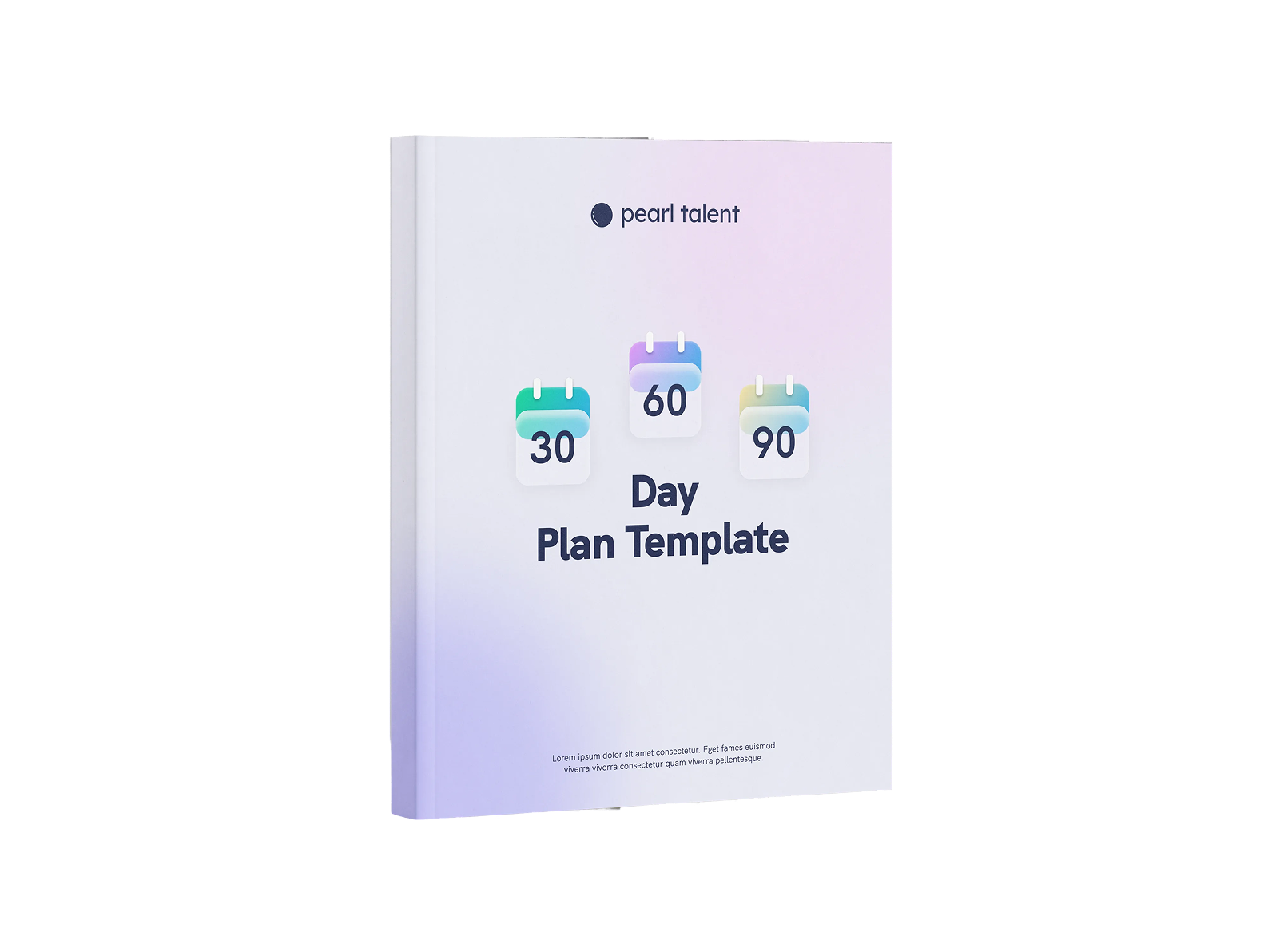

.svg)


















